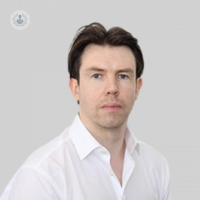Recognising stroke in elderly people
Written in association with:Stroke is a serious medical emergency that becomes increasingly common with age. Understanding its warning signs, types, management options, and prevention strategies can make a significant difference in outcomes.
Dr Frederick Boyle, renowned consultant in geriatric medicine, stroke medicine and general medicine, provides a detailed overview of stroke in elderly people.

What are the warning signs of a stroke in elderly people?
A stroke happens when blood flow to a part of the brain is interrupted or reduced, depriving the brain tissue of oxygen and essential nutrients. In elderly people, the key to early detection is knowing the FAST acronym:
- Face: One side of the face may droop or feel numb. A person might find it difficult to smile, and their mouth or eye could droop on that side.
- Arms: Weakness may develop in one arm. When trying to lift both arms, a person might struggle to raise one completely.
- Speech: Speech may become slurred, garbled, or entirely lost. A person might also struggle to understand what others are saying.
- Time: Time is of the essence. Quick action during a stroke can save lives.
Beyond these symptoms, other warning signs include sudden confusion, trouble seeing in one or both eyes, difficulty walking, loss of balance or coordination, dizziness, and sudden severe headaches without a known cause. Elderly people, in particular, might be more prone to experiencing milder or atypical symptoms, making them harder to recognise.
What are the main types of stroke that affect elderly people?
There are three main types of stroke that commonly affect elderly people:
Ischaemic stroke
An ischaemic stroke occurs when a blood clot obstructs or narrows an artery that supplies blood to the brain. In elderly people, this is often caused by underlying health conditions such as hypertension (high blood pressure), high cholesterol, or atrial fibrillation, which increase the risk of blood clots. This is the most prevalent type of stroke, accounting for approximately 85% of all cases.
Haemorrhagic stroke
A haemorrhagic stroke occurs when a blood vessel in the brain ruptures, causing bleeding in or around the brain. Although this type of stroke is less frequent, it’s more serious and it’s often linked to a higher risk of death or long-term disability. Hypertension is a major risk factor.
Transient ischaemic attack (TIA)
Often referred to as a "mini-stroke," a TIA takes place when blood flow to the brain is temporarily blocked. While the symptoms resemble those of a full stroke, they are short-lived and don’t cause permanent damage. However, a TIA serves as a warning sign that a full stroke could happen in the future and hence, should be treated as a medical emergency. Older adults who experience a TIA are at an increased risk of suffering a subsequent stroke within days or weeks.
What does stroke management for elderly people involve?
The first priority in stroke management is to restore blood flow to the brain as quickly as possible.
In the case of an ischaemic stroke, thrombolytic therapy, which involves administering clot-dissolving medications such as alteplase, can be used if the patient arrives at the hospital within the first few hours of symptom onset. In some cases, a mechanical procedure called a thrombectomy may be required to remove the clot through surgery.
For a haemorrhagic stroke, treatment focuses on stopping the bleeding and alleviating pressure on the brain. This may involve medications to reduce blood pressure or surgical procedures to repair damaged blood vessels.
After the acute phase of stroke treatment, long-term rehabilitation is critical to help regain lost skills and improve quality of life. Rehabilitation for elderly people may include physiotherapy, which helps improve strength and coordination, and speech therapy to manage any language or communication difficulties.
Ongoing medical care for elderly stroke survivors typically involves a multidisciplinary team. For some patients, ongoing support with daily activities, such as eating, dressing, or bathing, may be required, especially in cases of severe disability.
Additionally, post-stroke care also focuses on managing the risk factors that may have contributed to the stroke, such as controlling blood pressure, managing diabetes, or addressing heart conditions like atrial fibrillation. Medications like antiplatelet drugs or anticoagulants may be prescribed to help prevent future blood clots.
If you would like to book an appointment with Dr Frederick Boyle, head on over to his Top Doctors profile today.


